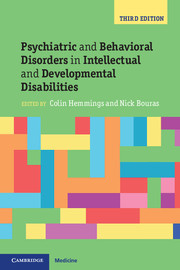Book contents
- Psychiatric and Behavioral Disorders in Intellectual and Developmental DisabilitiesThird Edition
- Psychiatric and Behavioral Disorders in Intellectual and Developmental Disabilities
- Copyright page
- Contents
- Contributors
- Preface
- Section 1 Foundations
- Section 2 Mental disorders
- Section 3 Interventions
- Section 4 Special topics
- Section 5 Services
- Section 6 Reflections
- Index
- References
Section 5 - Services
Published online by Cambridge University Press: 05 March 2016
- Psychiatric and Behavioral Disorders in Intellectual and Developmental DisabilitiesThird Edition
- Psychiatric and Behavioral Disorders in Intellectual and Developmental Disabilities
- Copyright page
- Contents
- Contributors
- Preface
- Section 1 Foundations
- Section 2 Mental disorders
- Section 3 Interventions
- Section 4 Special topics
- Section 5 Services
- Section 6 Reflections
- Index
- References
- Type
- Chapter
- Information
- Publisher: Cambridge University PressPrint publication year: 2016



